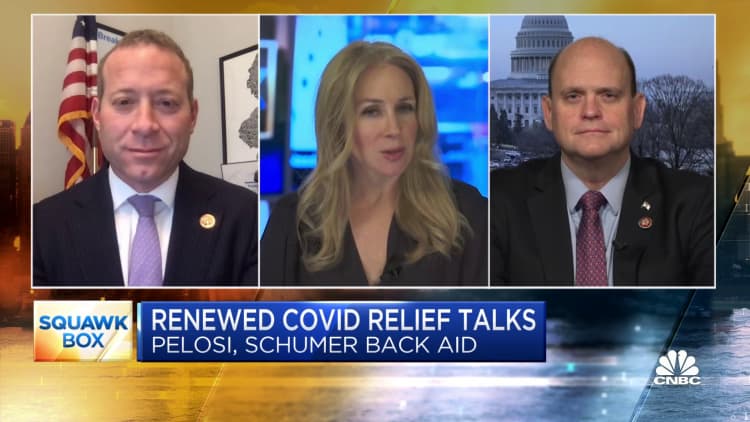
The tide on Capitol Hill is shifting in favor of compromising to pass a new economic stimulus package to help Americans and U.S. small businesses struggling during the coronavirus pandemic, the leaders of the bipartisan House Problem Solvers Caucus told CNBC on Thursday.
"The bottom line is, this is right in the range of reason. It's not a perfect bill, but it is a compromise bill that can bring people together," Rep. Tom Reed, R-N.Y., said on "Squawk Box."
His co-chair of the Problem Solvers Caucus, Rep. Josh Gottheimer, added in the same interview: "We're exhausted ... after how long we've been fighting to get something done, but I really believe now you're seeing the momentum in this next week to get this emergency package into law."
"I think there's a deep recognition ... that we've got to get something done. People are really hurting. Small businesses are going out, scores of them, every single day," the New Jersey Democrat said.
The Problem Solvers Caucus this week unveiled a $908 billion coronavirus stimulus plan with a bipartisan group of senators, including Sens. Joe Manchin, D-W.Va., and Mitt Romney, R-Utah.
House Speaker Nancy Pelosi and Senate Minority Leader Chuck Schumer, who had for months backed a more expensive relief bill, put their support behind the bipartisan proposal Wednesday, calling on Senate Majority Leader Mitch McConnell to use it as the basis begin stimulus negotiations.
McConnell, a Kentucky Republican, has favored a smaller package closer to $500 billion. In rejecting the bipartisan proposal Tuesday, he said, "We just don't have time to waste time." President Donald Trump supports McConnell's approach, Treasury Secretary Steven Mnuchin said Wednesday. "We look forward to making progress on that," Mnuchin said, according to Reuters. Mnuchin and Pelosi had tried for months but failed to reach a deal before the election.
McConnell said on the Senate floor on Thursday, "Compromise is within reach. We know where we agree. We can do this." He also he sees "hopeful signs."
The lawmakers who helped craft the new $908 billion package — which includes funds for small business aid and a $300 per week unemployment supplement — believe it will continue to gather support in Washington. "It's time to listen to the American people," said Reed, who has for months been urging action by Congress, which has been in a stalemate since the summer over additional relief even as the pandemic continued to rage.
Reed, who represents a large swath of western and central New York state, said he has heard in recent days that there could be more Republican support for a coronavirus relief package in the range of $550 billion to $700 billion. "So that means we're real close. You look at where the Democratic leadership was. They were at $1.3 trillion. They're now at $900 billion supporting this bipartisan, bicameral package that we put together," he said.
"Now you're seeing the movement in the Senate. You see the White House in a position to potentially sign a package. They recognize we have to get this done as Covid surges, as people continue to suffer, businesses running out of the lifelines," added Reed. "The bottom line is, this is right in the range of reason. It's not a perfect bill, but it is a compromise bill that can bring people together."
Correction: This story was revised to correct that Reed is a Republican. One earlier version misstated his affiliation.


